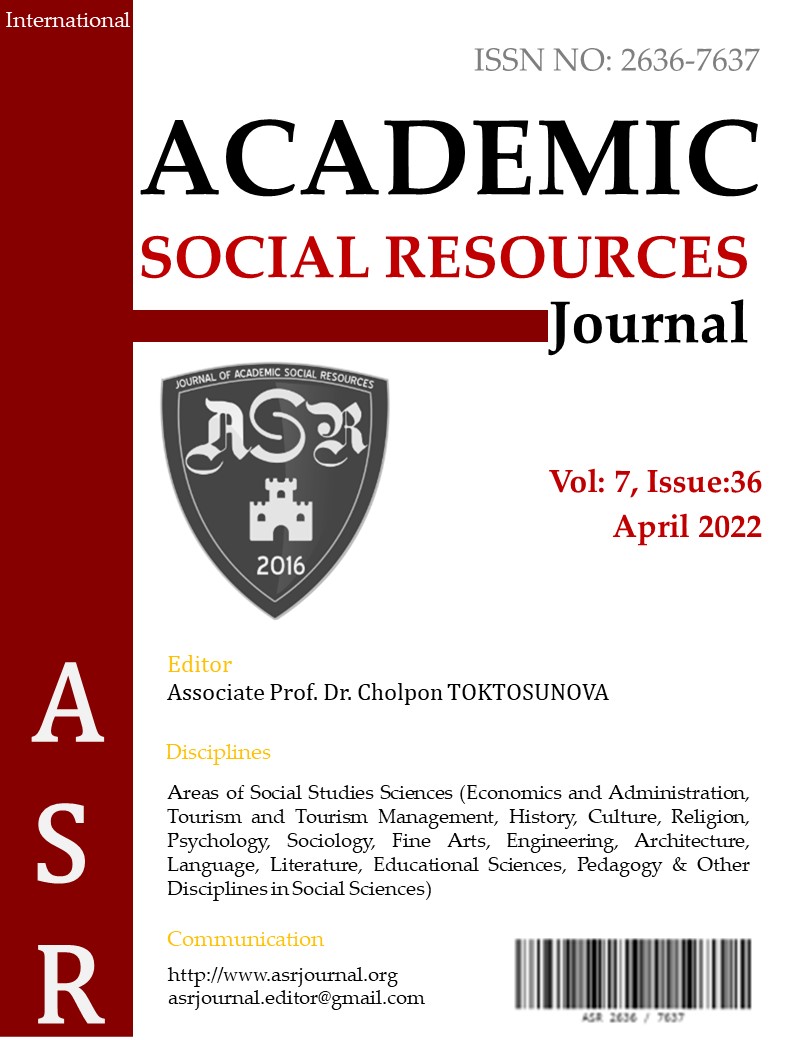Author :
Abstract
Roman sanatı belgelere dayanmadığı için kişinin veya toplumun yaşadığı olayların anlatılabildiği bir edebi türdür. Toplumların yaşadığı travmalar, acı ve işgaller bu tür vasıtasıyla hikâye edilebilmektedir. XVII. Yüzyılda kullanılan roman türü gelişim göstererek günümüze değin kullanılagelmiştir. Ancak birinci dünya savaşı sonrasında Arap ülkelerinin yabancılar tarafından işgal edilmesi bu çalışmaları kimi zaman sekteye uğratmış kimi zamanda diğer Arap ülkelerine ulaşmasına mâni olmuştur. Şarku’l-Mütevassıt romanını incelediğimiz Abdurrahman Münif XX. Yüzyıl Modern Arap Edebiyatının önemli temsilcilerinden birisidir. Demokrasi kavramının olmadığı toplumlarda otoriteye zıt fikirlerin nasıl cezalandırıldığını roman olarak kurgulamıştır. Bununla birlikte roman fikirleri sebebiyle mahkûm olanları, hapishaneleri ve otoriter rejimlerin bunlar üzerindeki etkilerini de konu edinmektedir. Kendisi edebiyatçı kimliğinin yanı sıra petrol mühendisi, akademisyen ve ekonomisttir. Birçok dergide yazılar kaleme almış ve OPEC bünyesinde danışman olarak da görev yapmıştır. Münif Suudi Arabistan vatandaşlığından çıkartıldıktan sonra kendisini yazmaya adamıştır. Doğuyu ve batıyı tanıyan yazar içinde yaşadığı toplumun güncel sorunlarını Avrupa ile mukayese ederek çözümler aramaktadır.
Keywords
Abstract
Since the art of the novel is not based on documents, it is a literary genre in which the events of the person or society can be told. Traumas, pain, and occupations experienced by societies can be told through this genre. XVII. the type of novel used in the 20th century has developed and has been used until today. However, the occupation of Arab countries by foreigners after the First World War sometimes interrupted these efforts and sometimes prevented them from reaching other Arab countries. Abdurrahman Munif XX. He is one of the important representatives of 19th Century Modern Arabic Literature. He fictionalized how the ideas contrary to authority are punished in societies where the concept of democracy does not exist. However, the novel also deals with the convicts, prisons, and the effects of authoritarian regimes on them because of their ideas. He is a petroleum engineer and economist as well as a literary man. He has written articles for many journals and worked as a consultant for OPEC. After Munif was stripped of his Saudi Arabian citizenship, he devoted himself to writing. The author, who knows the east and the west, seeks solutions by comparing the current problems of the society he lives in with Europe.
Keywords
- Abdurrahmân Münîf, el-Kırâa ve’n-Nisyân el-Hurûc Min Muduni’l-Milh, Tuwa Media Publishing, Londra, 2015, s.
- Abdurrahmân Münîf, el-Kırâa ve’n-Nisyân el-Hurûc Min Muduni’l-Milh, Tuwa Media Publishing, Londra, 2015, s. 63-64.
- Abdurrahman Münif, Şarku’l-Mütevassıt, Mektebetü’l-Âlemiyye, Bağdat Abd al-Rahman Munif, East of Mediterrenean, Sagibooks, 2007.
- Ahmet Yıldız, “Murîd el-Berğûsî’nin Raeytu Râmallah İsimli Romanının Teknik ve Tematik İncelemesi”, Cumhuriyet İlahiyat Dergisi 25/1, Haziran 2021
- Ali Eminoğlu, “Muhammed Hasan Alvân’ın ‘Mevtun Sağîrun’ (Küçük Bir Ölüm) Adlı Romanının Teknik ve Tematik İncelemesi”, Necmettin Erbakan Üniversitesi İlahiyat Fakültesi Dergisi 46/46, 2018
- Amine Yûsuf, Tekniyyâtu’s-Serd fi’n-Nazariyye ve’t-Tatbîk, El-Müessese el-Arabiyye li’d-Dirâse ve’n-Neşr, Beyrut, Balcı, Musa, Taşa Kazınmış Sözler, Büyüyen Ay Yayınları, İstanbul, 2016
- Bourneur, Roland - Quellet, Réal. Roman Dünyası ve İncelemesi. çev. Hüseyin Gümüş. Ankara: Kültür Bakanlığı Yayınları, 1989.
- Edward Morgan Forster, Roman Sanatı, çev. Ünal Aytür, Adam Yayınları, İstanbul, 2001 Fatih Tepebaşılı, Edebiyat Bilimine Giriş, Çizgi Kitabevi, 2015
- Fatih Tepebaşılı, Roman İncelemesi, Çizgi Kitabevi, İstanbul, 2019
- Faysal Derrâc, Abdurrahmân Münîf ve Rivâyetu’l-İltizâm, Merkezu’d-Dirâsâti’l-Vahdeti’l-Arabiyye, Beyrut, 2012
- Hasan Harmancı, “Abdurrahman Munîf’in el-Escâr ve İğtiyâlu Merzûk Adlı Romanının Teknik Yönden İncelenmesi”, Selçuk Üniversitesi Edebiyat Fakültesi Dergisi 30 (2013)
- Hasen Behrâvî, Bunyetu’ş-şekli’r-rivâî, el-Fezâ’-ez-Zemene’ş-Şahsiyye, el-Merkezu’s-Sekâfiyyu’l-Arabî, Beyrut,İlknur Emekli, “Abdurrahmân Münîf ve Risâle Min Verâi’l-Hudûd Adlı Kısa Öyküsü”, Atatürk Üniversitesi Güzel Sanatlar Enstitüsü Dergisi, sayı: 35, Erzurum, 2015
- Judith Gabriel, “Bidding Farewell to Munif, Novelist Bears Witnes to Repression, Corruption, Reverence for CommonFolk”, Al-jadid, Vol, 9, 45 Fall, 2003
- Mehmet Bakır Şengül, “Romanda Zaman Kavramı”, Uluslararası Sosyal Araştırmalar Dergisi 4/16 (2011)
- Mehmet Önal, “Edebî Dil ve Üslup”, Atatürk Üniversitesi Türkiyat Araştırmaları Enstitüsü Dergisi 36, 2008 Mehmet Tekin, Roman Sanatı 1 Romanın Unsurları, Ötüken Neşriyat, İstanbul, 2012
- Meral Demiryürek, “Kurgusal Metinlerde İkinci Kişili Anlatıcı ve Bakış Açısı”, FSM İlmî Araştırmalar İnsan ve Toplum Dergisi, 2, (2013)
- Nabih Kassem, el-Fennu’l-Rivâiyy İnde Abdurrahman Münîf, el-Mekân, ez-Zamân, el-Şahsiyye, Tel Aviv Üniversitesi, Edebiyat Fakültesi, Arap Dili ve Edebiyatı Bölümü (Yayınlanmış Doktora Tezi), Mart, 2002
- Nurullah Çetin, Roman Çözümleme Yöntemi, Öncü Basımevi, Ankara 2003
- Özcan Gürbüz, “Düşünce ile Tema ve Konu”, Kurgu Dergisi 18, 2001
- Philip Stevick, Roman Teorisi, (çev. Sevim Kantarcıoğlu), Gazi Üniversitesi Basın-Yayın Yüksekokulu Matbaası, Ankara, 1988
- Ronald B. Tobias, Roman Yazma Sanatı, çev. Mehmet Harmancı: Say Yayınları, İstanbul, 1996 Şerif Aktaş, Roman Sanatı ve Roman İncelemesine Giriş, Akçağ Yayınları, Ankara, 1991
- 71 Abd al-Rahman Munif, East of Mediterrenean, Sagibooks, 2007.
- Ülkü Tuğrul, Abdurrahman Münif Şarku’l-Mütevassıt İsimli Romanın İncelenmesi, Dicle Üniversitesi Sosyal Bilimler Enstitüsü, (Yayımlanmamış Yüksek Lisans Tezi), Diyarbakır 2006
- Yumnâ el-‘Îd, Tekniyyâtu’s-Serdi’r-Rivâî fî Davi’l-Menheci’l-Bünyevî, Dâru’l-Fârâbî, Beyrut, 2010





